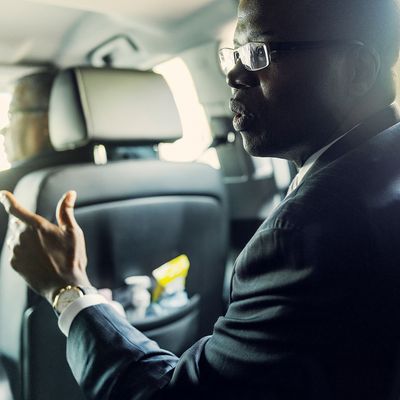
Brooklyn district attorney Ken Thompson, who unexpectedly passed away this week, knew he was living on borrowed time. It’s why he got into politics.
Last spring, during some of our conversations for the New York feature I wrote about his unlikely political rise last year, Thompson told me about his “epiphany moment,” which he struggled with discussing publicly.
We were driving around in his taxpayer-provided SUV, a detective at the wheel and a large bottle of Purell stuffed in the seatback in front of him after shaking so many hands around the churches, precincts, and block parties of Kings County, a diverse territory overseen by one of the country’s largest political shops. Thompson was the new boss.
He remembered checking into the hospital in great pain the night of the epiphany, roughly four years ago. In the bathroom, he collapsed. Struggling in the dark, he managed to call for help. Moments later, he said, he was rushed into a surgery and doctors removed his appendix. It was about to burst, which could have killed him.
The close call, Thompson said, forced him to consider a more altruistic path.
At the time, Thompson was doing very, very well in the private sector, as the co-founder of a law firm that specialized in employment-litigation cases. He had won massive settlements against corporate behemoths like Walmart and others for clients like Nafissatou Diallo, the hotel worker who claimed she was sexually assaulted by Dominique Strauss-Kahn.
What else could he ask for? He had a thriving law practice, a growing portfolio of real estate, a young family, friends in high places, even choice season tickets to the Brooklyn Nets.
But it wasn’t enough, and after surgery, Thompson told me, he decided to enter politics. Public service, he felt, had been God’s calling for him, and he decided to run for D.A.
“I just feel that no matter who you are, no matter where you come from, no matter what you believe, you should be able to walk the streets of Brooklyn free of fear of being attacked,” Thompson said, describing his motivation.
One could be forgiven for wondering if he’d at least considered the possibility of running for D.A. prior to that night in the hospital. While a life-threatening medical emergency is an obvious moment for taking stock, Thompson had spent his entire workaholic career navigating a maze of wealth and power. Regardless, after he got out of the hospital, minus his appendix, he did start taking the steps he needed to take to run for office.
Now, his family, former colleagues, and many admirers are getting ready for his funeral, which takes place tomorrow in Brooklyn. In May, according to a source close to him, Thompson had gone for a doctor’s visit. Routine tests were conducted and he was diagnosed with colorectal cancer.
Thompson thought he could fight it, but the cancer had developed to such a degree that it was not treatable. As he got sicker, he stopped coming into the office — a departure for a man known for working six days a week. He only announced his illness a week before he died.
He’ll be remembered for the progressive initiatives he launched. In July 2014, shortly after he replaced Charles Hynes, the decades-old incumbent then facing allegations of corruption and prosecutorial misconduct, Thompson shocked the NYPD and City Hall by announcing that his office would no longer be prosecuting defendants charged with possessing small amounts of marijuana — in essence, declaring that smoking a joint on the streets of Brooklyn wouldn’t carry a legal punishment.
Thompson’s move put then-police commissioner Bill Bratton in a bind. Should his cops follow the statutes and make the arrests, knowing that Thompson and his prosecutors would just toss them out? At the time, Thompson was criticized for announcing such a significant policy change without lining up support from other players in city government first — the cops, the mayor, and so on. But his instinct to strike first won praise from reformers, and the city’s other prosecutors eventually followed suit.
He also led the way on wrongful convictions, funding a robust internal department inside the office to review tainted cases, leading to the release of more than 20 inmates, with hundreds of cases still under review.
“Ken was someone who was interested in getting from A to B in a straight line,” says Lupe Todd-Medina, Thompson’s former spokeswoman. “He didn’t stop in the middle and draw circles.”
Up close, Thompson lacked much personal style. He described himself as a bookworm who got lost in biographies as a kid to escape the Harlem housing project where he was raised by a single mom, one of the NYPD’s first female cops. He was tall, with a commanding presence, but also shy. His boxy suits hung off him, and he didn’t appear interested in cultivating a more carefully tailored public image.
“I think my style is direct, to the point,” he told me.
During our conversations, it was difficult to get Thompson to open up. He really only seemed comfortable when we were talking about sports. I remember asking him what basketball team he liked best.
He paused to consider the implications of his answer.
“I like the [San Antonio] Spurs,” he said. “Obviously I don’t want the people of Brooklyn knowing that, but I like them. I love this young kid Kawhi Leonard — Parker, Ginobili, Duncan, Popovich. The whole crew.”
He was not a natural politician, at ease in the public light. Instead, he was a private lawyer who got elected to a position of extraordinary power.
Thompson was a rare creature in public life for numerous reasons: He was a party outsider and first-time candidate who ousted an entrenched incumbent; and he was a prosecutor who was born in the same kind of city housing projects that, in office, he worked to clean up.
I remember driving around with him and his security detail, cruising down his beautiful tree-lined street in Fort Greene. He could still barely believe that this life was his — surrounded by detectives, constantly being asked to shake hands and pose for pictures. He recalled all the books he read as a kid on the subway, like Claude Brown’s Manchild in the Promised Land, a novel about fighting up from the ghetto and breaking through layers of class.
“I’m not going to toot my own horn, but for me to sit here and talk with you as Brooklyn D.A., based on where I come from,” he said. He smiled to himself, still guarded but quite proud.





























